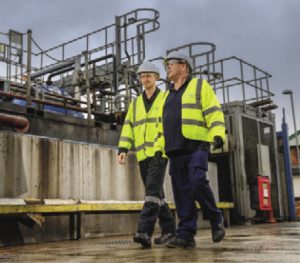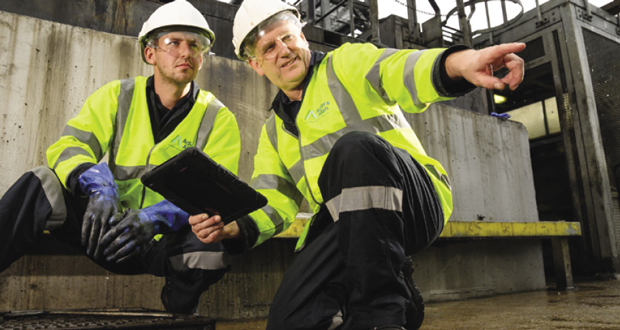ENVIRONMENTAL ISSUES
BRYAN CHERRY, ENVIRONMENTAL RISK SURVEY MANAGER, FROM ADLER AND ALLAN:
If you are still to reopen your sites following lockdown, or you encounter localised lockdown during the winter, here are some environmental considerations to ensure you remain compliant and don’t cause unnecessary damage when restarting your operation that could lead to more downtime.
CRITICAL EQUIPMENT
If you haven’t been running equipment like tanks, pumps and fuelling systems while the lockdown has been in force, you might find when you restart them, they don’t work. You should work with specialists to service critical equipment before you switch it back on, to ensure everything is in good working order. They will diagnose and solve problems, such as degraded fuel quality in generator tanks, to get you back up and running, minimising further disruption to your operation. It is also important to ensure systems that have continued to operate, such as septic tanks and drainage, are operating effectively.
If your equipment hasn’t been in use during lockdown there is a small possibility that hazardous materials could have leaked whilst you have been off site, or maintenance issues caused by the downtime could cause a spill when equipment is restarted. It is a good idea to engage a specialist response contractor to be on hand when you restart equipment to deal with a spill of any hazardous or polluting material quickly and effectively.
PREPARING FOR WINTER: KNOW YOUR RISKS
Now lockdown has eased in the majority of the country, it is important to refocus on preventing environmental risks. Don’t let winter cause any further unnecessary downtime to an already turbulent year. Follow these simple steps to identify your environmental risks and ensure your sites remain safe and compliant, whatever this winter has in store.
Check your separators: Separators are essential for avoiding pollution. If left unchecked, they can become blocked and their filters saturated, creating a flooding risk or causing polluted water to contaminate the local environment. Ignoring the state of your separators could result in hefty fines and prosecution. Environment Agency and EN standard EN858-2 states that separators should be serviced at least twice a year. Just before winter is a good time to do this as dust caused by long dry spells in the summer build up and turn into silt when it rains which can quickly block separators.
Tanks and pipes: If you store fuel on your site, the colder months can bring an increased demand and risk, with tanks and pipes liable to being damaged by freezing temperatures. A common problem for tanks as the temperature drops is burst pipework, so steps should be taken to protect them against corrosion and physical damage.
With lockdown, followed by summer, heating systems are likely to have been switched off for an extended period this year. The system should be checked before switching it back on to ensure the integrity of the tanks and pipes to avoid the risk of oil spills.
Drainage: Ensure all drainage on your sites is running clear and free. Autumn is a good time to do this with the leaves dropping. If your gully pots become blocked with a build-up of leaves and debris a high level of water can mean they become overwhelmed. Engage a specialist to check the drainage on your sites and ensure these are running free. If the worst does happen and a flood does occur, having an emergency response contract can save you time and hassle arranging for the water to be pumped out getting you back up and running quickly and safely.
Bunds: Checking the integrity of your bunds is imperative at the start of winter. The changes in temperature from hot to cold can cause the lining or joints to crack which can cause hazardous materials to be released into the environment leading to downtime, costly clean-up and potential environmental fines.
 Checking the pump or drain valve on your bunds is also a good idea to make sure they are working effectively in managing the build of liquids. A specialist can check all the bunds across your sites and offer remediation work to make them safe and compliant before the winter comes.
Checking the pump or drain valve on your bunds is also a good idea to make sure they are working effectively in managing the build of liquids. A specialist can check all the bunds across your sites and offer remediation work to make them safe and compliant before the winter comes.
Rainwater harvester: A lot of sites, particularly those that are unmanned, are investing in rainwater harvesting for systems such as toilet flushing and non-drinking water hand washing basins. Like any asset, these require maintenance to ensure they remain operational. Before the winter it is good to check their shut off valve is engaged so heavy rainfall doesn’t overwhelm them and they are protected from frost.
Environmental risk audit: This has been an unprecedented year so far and we are expecting the winter to bring about additional challenges. But with it comes opportunities to reassess your business operations to ensure that you don’t incur any unnecessary costs or downtime and thus giving you a critical advantage over your competitors.





